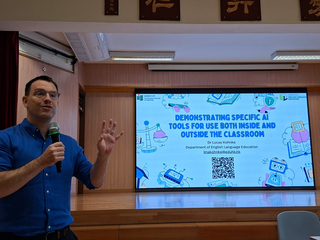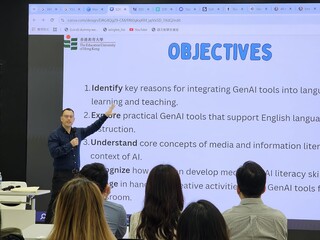Public Lecture Series 2023
- 2023年03月11日-2023年04月01日 | 9:30am-12:00nn
- Tai Po Campus D2-LP-08 or Online via ZOOM
- 讲座
- 英语
- Department of English Language Education
Public Lecture Series 2023
E-certificates of attendance will be issued to participants.
Online learning has become the new normal of learning due to the outbreak of pandemic. Even after the pandemic, there is a tendency that online learning and offline learning will remain. Many educators, however, find engaging students in online settings challenging. Gamification, the use of game design elements in non-gaming contexts, is considered an effective approach to create joyful, motivating and engaging learning environments. This presentation will focus on the current status, theoretical foundations and challenges of applying gamification for educational purposes. Dr. Shen Qiao will present her recent research demonstrating the positive effects of gamification on student cognitive, social and emotional outcomes, as well as her various gamification designs that showcase the facilitating and inhibiting factors for student gamified learning.
About the Speaker:
Dr. Shen Qiao is a Research Assistant Professor in the English Language Department at the Education University of Hong Kong. She received her Ph.D. in education technology from the University of Hong Kong in 2022. Her research interests focus on game-based learning, gamification and AI in education. She has published articles in SSCI journals, including British Journal of Educational Technology, Language Learning & Technology and Journal of Computer Assisted learning. She currently focuses on exploring whether and how AI-powered digital gamification engages language learners, thereby influencing students’ social interactions and language learning achievement.
Parents always complain that their kids do not learn English in the classroom; teachers always grumble that students do not study English at home. What happened to our children? To enable young learners to learn English more effectively, enhancing their motivation is the key to success. In this talk, Denis is going to investigate what interests and demotivates children in the English learning journey so that teachers and parents can avoid them. Also, he will share useful tips for using innovative resources, including Apps, games, and traditional tools, such as picture books, to engage students to learn English inside and outside the classroom.
About the speaker:
Mr Denis Wong is Lecturer of Department of English Language Education of the Education University of Hong Kong. Denis has years of primary English Language Teaching experience. He was an English panel chairperson of a local primary school prior joining the University. His current projects include using eBooks to motivate primary students to learn English and using animations to engage primary students to in learning English. His teaching interests lie in primary ELT methodology and English pronunciation.

Within the English language teaching profession there is now general acceptance of the advantages of integrating language and content teaching. Yet challenges continue over how such integration can be accomplished within individual classrooms. The talk will introduce a number of factors that constrain and enable learners’ oral participation and classroom pedagogical strategies that teachers can employ to support and promote student talk in EMI classrooms.
About the speaker:
Professor John Trent is a Professor and Associate Dean (Graduate School) at the Education University of Hong Kong. His research interests include teacher identity, discourse analysis and teacher education.
Linguistic landscape (LL) research examines how languages, texts, signs and people intersect with each other in and through specific spaces (e.g., urban squares, classrooms, tourist sites). This field has paid particular attention to multilingualism and multiculturalism in relation to regional and transnational migration, (urban) economic and political transformation and stabilized or changing collective identities and relationships (e.g., linguistic and cultural inequalities) in and across different physical, social and cultural locales. Therefore, as an increasing number of LL researchers have argued, LL bears high value in educating students and other communities about authentic second language use, language creativity, critical linguistic and cultural awareness, translingual and transcultural competencies, etc. through both conventional and novel means. This talk will begin with a review of LL research with an educational orientation and then present a number of examples that show how LLs can serve as an innovative and effective resource and tool for additional language education in multilingual and multicultural contexts.
About the speaker:
Dr. Corey Fanglei Huang is a Research Assistant Professor at the Department of English Language Education in the Education University of Hong Kong. He has taught courses in academic English, critical thinking and literacy and qualitative research methods at the University of Hong Kong and the Education University of Hong Kong over the past few years. His research areas include sociolinguistics, critical (multimodal) discourse studies, linguistic/semiotic landscape research and public mental health communication. He has published his linguistic landscape and multimodal discourse research in several international journals such as Journal of Sociolinguistics and Critical Discourse Studies.

WHO refers to infodemic as “an overabundance of information – some accurate and some not – that makes it hard for people to find trustworthy sources and reliable guidance when they need it.” Teaching students the skills to evaluate the reliability of online information and to exercise critical thinking is vital for survival in the infodemic era when misinformation is paramount. In this seminar, I will share the design and adaptation of different sources of material, particularly the Civic Online Reasoning curriculum, in teaching online reasoning and critical thinking in an academic English course for upper-intermediate level students, and tips for igniting students’ curiosity and engaging them in interactive communication.
About the speaker:
Dr. Katherine Chen is Associate Professor of Applied Linguistics and Director of the English Language Centre at the University of Macau. She had previously taught at the University of Hong Kong and the University of Michigan, and had trained international PhD students to be instructors in Michigan. Her research specialities include language ideologies and identities, multilingualism and transnationalism, the discourse and application of Mindfulness. See her profile at https://sites.google.com/view/katherine-chen/
Is “6uo” English? Cantonese? Cantonese-English codemixng? Or simply, Kongish? Many studies researching Cantonese-English mixings (including, but not limited to, the study of Cantonese and English code-mixing), Hong Kong English utilizes existing labels such as code-mixing, code-switching, loanwords, pidgin, creole, and speech continuum to position their research, and these terms have been actively used in the academic communities studying language variations in Hong Kong in the last decades. The new label “Kongish” which I coined in 2015, however, cannot be perfectly fitted with these labels due to the post-multilingualism challenges in Hong Kong and beyond.
In this public lecture, I approach Kongish from a translanguaging perspective. This theoretical perspective focuses not on studying the common patterns or the linguistic outputs of the multilinguals, but instead on the multilinguals themselves and the translanguaging spaces they co-create through the interaction between them and their surrounding environments. Using Kongish as a case study, I will discuss the translanguaging perspective and the construction of translanguaging spaces, which promises to offer new insights to challenge the "English-only" pedagogical orientation and better prepare for the post-multilingualism challenges for ELT practitioners in the twenty-first century.
About the speaker:
During the day, Nick Wong, who does not take the bus to school, is a lecturer at the Center for Language Education, where he both tortures and teaches English to students from HKUST [the University of Stress and Tension (cross out)]. At night, he proclaims himself as the "Chef Editer" (not a typo) or a.k.a a "keyboard fighter", writing and sharing posts in Kongish on his Facebook Page - Kongish Daily. Surprisingly, his night job has been more successful than his daytime one: he has been interviewed by various media outlets for his midnight Kongish project, such as 100Most, Apple Daily (cross out), Mingpao, RTHK, SCMP, Singtao, The Straits Times, and even (blessed by) Wenweipo, to name a few. Currently, Kongish Daily has (only) around 75,000 followers on Facebook.

This talk is aimed at school-level English language teachers who are interested in incorporating new and innovative methods in their teaching. The development of the augmented reality tools (e.g., Augment, Adobe Aero) provides students with a visually stimulating environment to learn and make learning more engaging. Given this, language teachers are advised to explore innovative tools and seek ways to integrate them into the classroom teaching practices. Our presentation is designed to give teachers fresh perspectives and strategies for enhancing and diversifying their students' in-class language learning experiences. Furthermore, we intended to assist in-service instructors in going beyond traditional teaching approaches for equipping students with tools to explore and implement in out-of-class language learning environments.
About the speaker:
Dr Artem Zadorozhnyy is a Research Grants Council Post-doctoral Fellow at the Education University of Hong Kong. His research focuses on EFL students’ digital literacy, informal learning and the role of motivation in English language acquisition. His works have been published in the ReCALL journal, EUROCALL and CALL conference proceedings.
This presentation will provide teachers with pointers on how to use technology to support students’ learning both in and outside of the language classroom. Each tip will inspire you and offer a new way to incorporate technology into your teaching practice. It features three parts: 1) activities to try, 2) getting them right and 3) why they work. As part of the presentation, you will be provided with resources and sample activities that you can incorporate into your classroom immediately. If you are a beginner, they will help you start using technology for language learning; if you have experienced, you will surely learn about some new tools and tricks. In addition, you will learn about the theoretical underpinning of each activity and a practical rationale for bringing technology into the language learning classroom. The talk will address ways to incorporate technology to facilitate teaching reading, writing, speaking, listening, pronunciation and grammar. Finally, the presentation will cover how to ensure that your students remain safe while using technology. Practice makes perfect, so come along and be inspired!
About the speaker:
Dr. Lucas Kohnke is a Senior Lecturer in the Department of English Language Education, The Education University of Hong Kong. Lucas specialises in integration technology with English language learning and teaching. His research has been published in journals such as Educational Technology & Society, Education and Information Technologies, RELC Journal, and TESOL Journal, as well as other leading journals.








